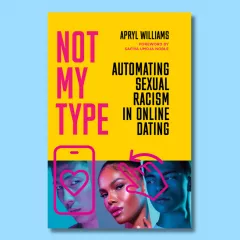
Apryl Williams is a jointly appointed Assistant Professor in the Department of Communication & Media and the Digital Studies Institute at the University of Michigan. She is also a Faculty Associate at the Berkman Klein Center for Internet & Society at Harvard University, a Senior Fellow in Trustworthy AI at the Mozilla Foundation, as well as an affiliated researcher at NYU's Center for Critical Race & Digital Studies. As a multidisciplinary scholar, Williams studies experiences of gender and race at the intersection of digital spaces and algorithmic technocultures.
In her first book, Not My Type: Automating Sexual Racism in Online Dating (Stanford University Press), Apryl Williams presents a socio-technical exploration of dating platforms' algorithms, their lack of transparency, the legal and ethical discourse in these companies' community guidelines, and accounts from individual users in order to argue that sexual racism is a central feature of today's online dating culture. She discusses this reality in the context of facial recognition and sorting software as well as user experiences, drawing parallels to the long history of eugenics and banned interracial partnerships. Ultimately, Williams calls for, both a reconceptualization of the technology and policies that govern dating agencies, and also a reexamination of sociocultural beliefs about attraction, beauty, and desirability.
Her new co-authored book project, "From Fair to Repair", is a critical intervention and hopes to reorient approaches to algorithmic futures amid rapid AI development and broad tech injustice. The field of algorithmic ethics is ever-growing but falls short with concern to repair, which includes reconfiguration of power arrangements and reconciliation in communities. The fairness paradigm dominates the field of ethical AI, machine learning, and algorithmic technocultures. We argue that in this context, fairness tries to address human biases by using “objective” computation to eliminate biases in data and in AI systems. These efforts towards fairness have been unsuccessful, with social inequities replicated and amplified through algorithmic systems. In this work, we argue for a new paradigm of algorithmic ethics, reparative justice, to displace “fairness” as a predominant approach in the field of critical algorithm studies. This book highlights the intersections of emerging theoretical positions: reparations as worldbuilding, technological design as integral to justice, and rising critiques of fairness in AI and algorithmic systems.
Williams' previous work has been published in leading interdisciplinary journals including Social Media + Society, Information, Communication & Society, the International Journal of Communication, and the Sociology of Race and Ethnicity. Her research has also been covered in popular press outlets including Time Magazine, Mic.com, Newsweek, Slate, BuzzfeedNews, NPR’s On the Media, and The Guardian.






![[Virtual] Racial Health Disparities and the COVID-19 Pandemic](/sites/default/files/styles/image_thumbnail/public/2020-05/RacialHealthDisparities.jpg.webp?itok=EXhP-g-d)